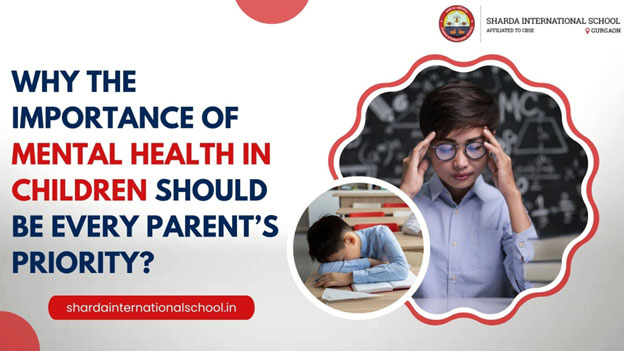Why the Importance of Mental Health in Children Should Be Every
Parent’s Priority
 Children are often seen as carefree and joyful beings, their
laughter filling homes with warmth and happiness. However, beneath
the surface, many children struggle with mental health challenges
that can have lasting impacts on their lives. And being parents
and teachers it is our responsibility to understand the Importance
of Mental Health in children's lives.
Children are often seen as carefree and joyful beings, their
laughter filling homes with warmth and happiness. However, beneath
the surface, many children struggle with mental health challenges
that can have lasting impacts on their lives. And being parents
and teachers it is our responsibility to understand the Importance
of Mental Health in children's lives.
The World Health Organization estimates that 10-20% of children
and adolescents globally experience mental health conditions. Yet,
these issues often remain unrecognized and untreated. It's time we
shed light on this silent crisis and prioritize the mental
well-being of our children.
“Mental health is not a destination, but a process. It's about
how you drive, not where you're going.”
- Noam Shpancer
The Invisible Struggle
Children, like adults, experience a range of emotions. However,
they may not always have the vocabulary or understanding to
express their feelings. This can lead to internalized struggles,
manifesting as behavioral changes, academic difficulties, or
physical symptoms.
Anxiety, depression, ADHD, and conduct disorders are among the
most common mental health issues affecting children. Untreated,
these conditions can lead to further complications, including
substance abuse, self-harm, and even suicide.
The Impact on Development
Mental health plays a crucial role in a child’s overall
development. It affects their ability to learn, build
relationships, and cope with stress. When Importance of Mental
Health is neglected, it can create a ripple effect, impacting
every aspect of a child’s life.
Studies have shown that children with mental health conditions are
more likely to experience difficulties in school, have trouble
making friends, and engage in risky behaviors. They may also have
lower self-esteem and a higher risk of developing chronic health
problems later in life.
“Children are like wet cement. Whatever falls on them makes an
impression.”
- Dr. Haim Ginott
The Role of Parents
Parents play a vital role in nurturing their children and making
them understand about the Importance of Mental Health. They are
the first line of defense in recognizing and addressing any
concerns. By creating a supportive and loving environment, parents
can help their children develop resilience and coping mechanisms
to navigate life’s challenges.
Key Strategies for Parents
-
1. Open Communication: Create an atmosphere where children feel
comfortable expressing their emotions without fear of judgment.
Encourage them to talk about their day, their worries, and their
dreams. This way the parents can understand the Importance of
Mental Health and try to help their child.
-
2. Active Listening: When your child speaks, give them your
undivided attention. Validate their feelings and let them know
you are there to support them.
-
3. Positive Reinforcement: Praise your child’s efforts and
accomplishments. This helps build their self-esteem and
confidence.
-
4. Healthy Lifestyle: Ensure your child gets enough sleep, eats
nutritious food, and engages in regular physical activity. These
factors play a crucial role in mental well-being.
-
5. Limit Screen Time: Excessive screen time can negatively
impact mental health. Set reasonable limits and encourage your
child to engage in other activities.
-
6. Seek Professional Help: If you notice any persistent changes
in your child’s behavior or mood, don’t hesitate to seek
professional help. Early intervention can make a significant
difference.
Breaking the Stigma
Unfortunately, mental health still carries a stigma in many
societies. This can prevent parents from seeking help for their
children, fearing judgment or discrimination. It’s crucial to
break this stigma and recognize that Importance of Mental Health
is just as important as physical health.
The Importance of Early Intervention
Early intervention is key in addressing the Importance of Mental
Health issues in children. By recognizing the signs and symptoms
early on, parents can seek appropriate treatment and support,
preventing further complications.
Creating a Supportive Community
Mental health is not just an individual issue; it’s a community
responsibility to understand the Importance of Mental Health.
Schools, healthcare providers, and other community organizations
play a vital role in promoting mental well-being in children.
The Benefits of Prioritizing Mental Health
When we know the Importance of Mental Health children’s lives, we
invest in their future. We empower them to lead fulfilling lives,
build strong relationships, and contribute positively to society.
How does Sharda International School help students to become
mentally strong?
Sharda International School understands the Importance of Mental
Health and believes that mental strength is just as important as
academic excellence. We foster a nurturing environment where
students feel safe to express themselves and learn vital emotional
skills. Through mindfulness practices, counseling sessions, and
engaging workshops, we equip our students to manage stress, build
resilience, and develop a positive outlook.
Our dedicated faculty members act as mentors, offering guidance
and support throughout the student's journey. We celebrate
individuality and encourage open communication, creating a sense
of belonging and acceptance within the school community. At
Sharda, we strive to empower every student with the mental
fortitude they need to thrive in an ever-changing world.
Conclusion
The importance of
mental health awareness
in children cannot be overstated. It is every parent's
responsibility to nurture their children’s emotional well-being
and create a safe space for them to grow and thrive.
By prioritizing mental health, we equip our children with the
tools they need to navigate life’s challenges and build a brighter
future for themselves and the world around them.
Remember,
“It’s okay not to be okay. Asking for help is a sign of
strength.”